Singapore is a small but fast-paced metropolitan city, and it’s common that many want their children to gain some headway in our highly competitive society. We send our children to a variety of enrichment classes throughout the week, ranging from tuition, ballet, martial arts to music lessons.

Music, in particular, is seen as a powerful building block for early years development and forms the backbone of the Kinderland Curriculum. The Children’s Music Programme (CMP) is a formal music education that teaches keyboard playing, solfege singing, rhythm, harmony, ensemble, rudiments of music theory, and music appreciation. Dr Carol Loy, Director of Curriculum & Professional Development at Kinderland sheds light on the key benefits of early adoption of music.
Music Supports Academic Growth
The importance of music in the development of language literacy is a factor that Kinderland recognises and implements in its curriculum through the CMP. Research has shown that music-making improves test scores regardless of socio-economic background, and children get higher marks in standardised tests and fare better in reading proficiency exams as compared to those with no music involvement.
Young children who have had music experience before they start school are shown to often have an edge over their peers in areas such as vocabulary and reading.
Early exposure to beats and rhythms also aids children in visualising topics in math, such as multiplication, division, patterns and fractions. Learning music at a young age can even get children prepared for subjects such as physics. Strumming a guitar or drum gets them used to vibrations and provides them with an elementary understanding of harmonic and sympathetic vibrations.
Who would have known giving your child a ukulele could turn them into the next Einstein?
Music Supports Physical Growth
Picking up an instrument can help encourage the development of a child’s fine and gross motor skills, as well as coordination, ambidexterity, and a greater sense of rhythm.
For example, little ones in Kinderland’s marching band develop acute aural sensibilities and refined motor skills, by coordinating the movements of their feet and hands while playing the drums, or their left and right hands while playing the keyboard and pianica.
For younger children, simply letting them express themselves to different beats can get them to actively move parts of their body, such as their arms and feet while learning to stay on beat, providing them with a well-rounded full-body workout too!
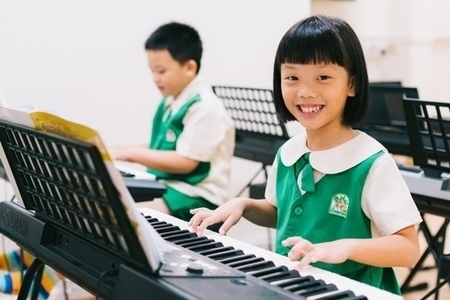
Music Teaches Social Skills
An early introduction to music can also teach young children to communicate with their peers. Kinderland’s CMP encourages little ones to express themselves through music, by improving their ability to express feelings better and cultivating an appreciation of teamwork.
This includes cooperating and compromising on who gets to play which instrument, contributing to the music (or noise), and working as part of a collective to create one sound. During music lessons, they will have the chance to make new friends with similar interests.
These classes require peer interaction and teamwork, and when a child is offbeat or rhythm they will have to alter their playing in order to suit the others.
Even if your child is sent for private lessons, they can still create a close bond with their teacher. Performances and recitals also teach children patience and how to be considerate and supportive of others.
Music Introduces Multiculturalism
Music is a universal language and a great way for young children to be introduced to other countries and societies.
Each culture has its own unique instruments and traditions which are often portrayed vividly in their music. By learning about and playing a wide array of instruments, young children will understand and appreciate diversity, for example, trying out a Tabla or Sitar, they will be introduced to Indian and Pakistani styles of music.
This, in turn, helps develop open-mindedness about societies and traditions beyond the ones that they are familiar with.
Music Builds Self-Esteem, Confidence, Discipline and Perseverance
When picking up music at a young age, young children are introduced to constructive criticism and how to take it in a positive manner. This helps increase their self-esteem and spurs them to be thoughtful about their actions and how to go about improving themselves.
Turning negative feedback into a positive learning experience will also help build self-confidence and is a useful school to hold on to as they grow up.
Learning in a group setting can teach young children that there is always room for improvement in some way, shape or form. Children who are part of Kinderland‘s percussion marching band programme have been shown to understand and practice values such as discipline and teamwork, as well as focus and confidence.
Picking up an instrument also encourages perseverance, through having to become comfortable when in an uncomfortable stance. This is because many instruments need to be used in a certain position for a prolonged period of time in order to play them, such as a guitar or flute.
Even though research shows that being exposed to the elements of music or taking up an instrument increases the holistic development of young children and how they see the world, parents should not forget that they should be heavily involved and engaged in the learning process too, for our children to get the most out of the experience.
We cannot just leave them to their own devices and expect a diamond to come out of the rough, so constant support and encouragement are key!
This article is contributed by Dr Carol Loy, Director of Curriculum & Professional Development at Kinderland.
* * * * *
Like what you see here? Get parenting tips and stories straight to your inbox! Join our mailing list here.
Running a service or business targeted for parents? Reach out to a wider audience in our Best Preschool Singapore compilation. Leave your contact details here and we will get in touch with you.











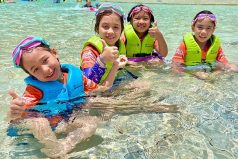
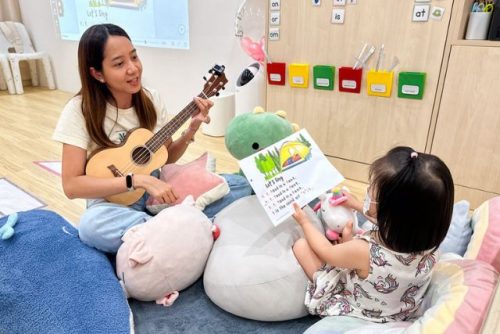

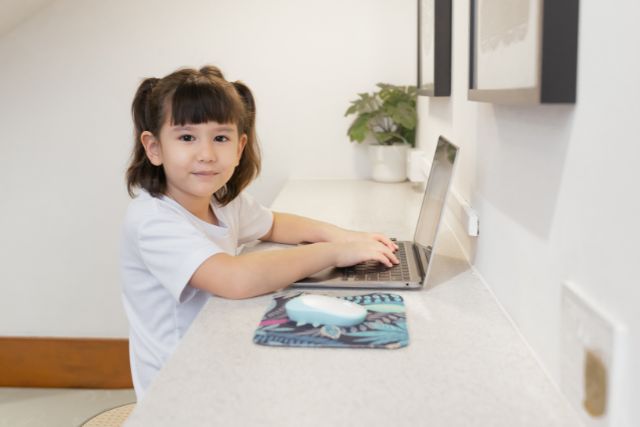

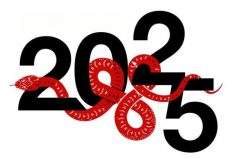

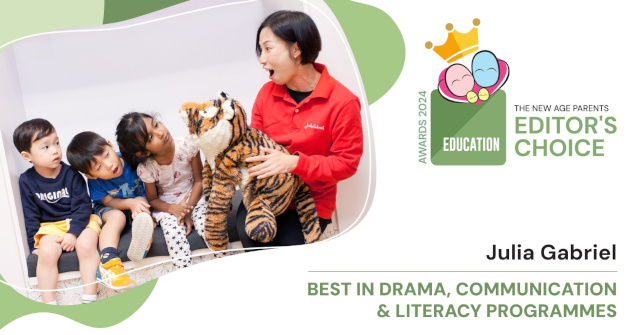









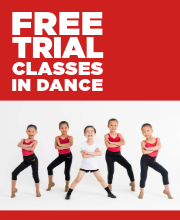












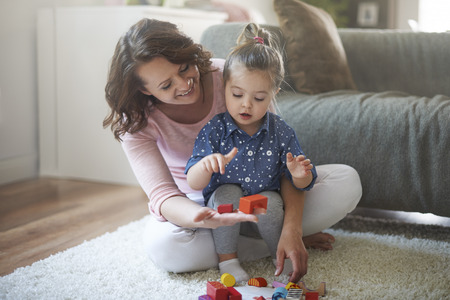


















Leave a Comment: